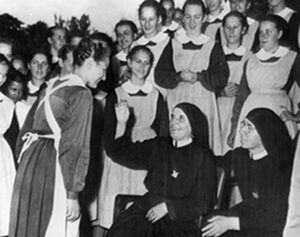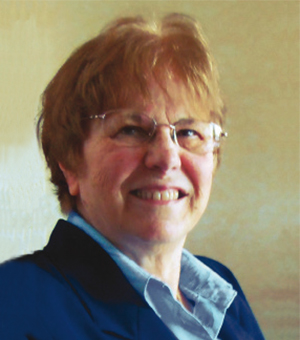I met Prima Maestra Thecla in 1955, when she came to Brazil together with Primo Maestro. I was an aspirant at the time, so I met her personally and later heard many testimonies and read her writings.
During my time of formation, I heard a lot about Maestra Thecla, about her faith, her prayer, her courage in leading a modern congregation that used the means of social communication for evangelization. A congregation that was fully in line with the needs of the times, and that used the most suitable and effective means of communication.
The day before Prima Maestra’s departure we were all gathered in the courtyard to say goodbye to her and listen to her final message. She shared only a few words, stressing the importance of taking advantage of the years of formation to prepare ourselves well for the Pauline mission and to become saints, a fundamental condition for the effectiveness of evangelization with the means of social communication. Afterwards, observing that beautiful group of young people, we were more than one hundred aspirants, Maestra Thecla surprised us with an unexpected question: Do you want to give a day of your life to Primo Maestro? Proud to be able to offer this gift, we responded in chorus: Yes. I don’t know if Primo Maestro’s life was extended because of our offering, but God certainly took it into account.
If our admiration and love for Maestra Thecla was great, even before meeting her, you can only imagine our feelings after seeing her simple, serene attitude and her bright smile in person! We joyfully said to ourselves: We were blessed, we can say we have seen a saint.

Thinking of Maestra Thecla today at the helm of a modern Congregation, whose mission is to bring the message of Jesus to everyone through the use of the media, we imagine a person involved in social media and present in the digital world 24 hours a day. But we know that Maestra Thecla wasn’t like that, she didn’t live for communication, but she lived communication. She didn’t have a degree, but she was a great communicator, an unforgettable guide for her daughters. This is precisely why we admire her; and from where her sublimity comes forth.
Thecla had not attended a faculty for a degree in communication, but she lived the truest, deepest communication, that communication founded on the Word of God, on the wisdom of God. Prayer, contemplation, a life lived in love were the source of her wisdom, goodness, foresight, and apostolic creativity. From this source, which is God himself, her teachings acquired a contemporary, current freshness and newness which continues to guide us today. This is what I appreciate and admire in her today, her way of communicating that was born from a lived faith, a simple, frank, sincere, genuine, and tender style of communication, but at the same time a strong, active, courageous, creative, far-sighted spirit. More than communicating thoughts, she communicated herself.
I ask for myself and for all the Daughters of Saint Paul in the world this same style of communication, to mirror this beautiful, intense and fruitful life.
Natalia Maccari, fsp
